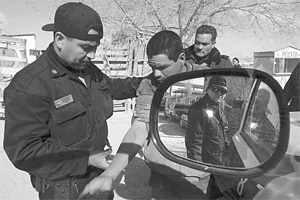 |
 |
 |
 Editorials | Issues | October 2006 Editorials | Issues | October 2006  
A Dose of Culture Fights Police Corruption
 El Universal El Universal


| | Officials in a rough area east of Mexico City are trying to transform their police officers by giving them a dose of culture. |
Ciudad Nezahualcóyotl, State of Mexico - On a recent afternoon, two dozen municipal police officers glided around a classroom in their socks, 9 mm submachine guns and pistols slung at their hips.

"Don´t be shy," said their instructor, encouraging them to slide their feet across a pile of brightly colored books strewn on the floor. "Let your toes do the exploring."

So what is this? A strange new fetish? Some eccentric fad?

Not quite.

Officials in this rough area east of Mexico City are trying to transform their police officers, among the most reviled members of Mexican society, by giving them a dose of culture: Classic literature, poetry, chess - and even sliding around in their socks if that´s what it takes.

The experimental cultural program for police officers began last year in Ciudad Nezahualcóyotl, a crime-ridden satellite city on the outskirts of the capital, as more than 1,000 hardened police officers took literature and creative writing classes.

"The traditional way of dealing with public security is to give police equipment and weapons, and with that, you´ll resolve the problem," said Roberto Pérez, who launched the project. "But it´s not enough. We can give a police officer the best training and equipment, but if he doesn´t have a calling, he can easily become corrupt."

Corruption is a familiar concern in Nezahualcóyotl. The last police chief, retired military Capt. Carlos García García, was arrested in 2002 and sentenced to 25 years in prison for collaborating with drug dealers.

"It´s a national problem," said Jorge Amador, a sociologist who replaced García in 2003. "We have a terrible police force."

After taking over, Amador quickly fired 400 officers, including about 45 who are now facing criminal charges, and hired 650 new ones.

But he blames the government, not the officers.

"We entrust our police with protecting our lives, physical integrity and possessions, but we treat them like dirt," he said. "That translates into low self-esteem and poor performance."

His solution: A nine-point program that combines traditional police training with personal development and ethics. In addition to attending biweekly literature courses, officers must take computer classes, keep fit and learn to play chess - to improve their strategizing.

And next month they will begin learning English.

In return, the officers earn points toward raises and promotions.

Amador says the program has already paid off by reducing crime. Car theft - the most reliable crime indicator since residents have to report it to collect insurance - has dropped by almost half since 2003, from an average of 18 cars stolen a day to 9.8. And the number of reported homicides in Nezahualcóyotl, with 3 million people, has fallen from 443 in 2003 to 354 last year.

Many residents said they saw a difference in the 1,130-officer police force.

"They aren´t so arrogant or despotic anymore," said Alejandro González, 30, who owns a chain of snow-cone carts.

After one of his customers was mugged recently, he called the police and timed their response. "They got here in less than a minute," he said. "Before, they wouldn´t have come at all."

The city government is also reducing officers´ shifts from 24 hours to 12 so they can continue their schooling. Only 20 percent of the officers have high-school diplomas. But Amador hopes that all his officers will eventually graduate.

He also plans to increase police salaries from US$600 to US$800 a month, bringing them on a par with their counterparts in wealthier Mexico City.

But the most novel aspect of the program is the literature courses. The curriculum blends such classics as Don Quijote de la Mancha with crime novels.

The goal is to persuade officers to read one book a month, not an easy task in a country where one study showed that 40 percent of those older than 15 don´t read books.

"We can´t force them to read," said Pérez, the former program supervisor. "We have to make them want to read."

The Mexican program has caught the attention of Scotland Yard, which fielded its own survey of officers´ reading habits. "They found that their police were hardly reading at all," Amador said.

His officers also write short stories about life on the job, the best of which are published in anthologies.

"People think police are ignorant and corrupt, and that we don´t care about anyone but ourselves," said Pedro Martínez, whose first-person account of a shoot-out was chosen for publication. "But it´s a lie. And we´re proving it by what we write."

He said he had also developed an appreciation for reading - particularly Don Quijote. The officers created their own version of the 400-year-old Spanish classic by subbing key words with police code and acting it out.

"They´re like me and my partner," Martínez said of Quijote and his faithful sidekick, Sancho Panza. "You always need a shield, someone to cover your back."

Amador has the backing of the new mayor, Víctor Bautista, a former leftist activist who has a personal interest in improving the police force. In 1982, he said he was briefly jailed and tortured by security forces during the government´s so-called dirty war against its opponents.

Amador said those types of complaints are decreasing.

"After two years of this program," he said, "I can categorically affirm that our officers are better police - and better citizens." | 
 | |
 |



